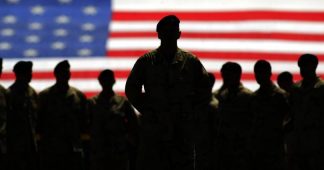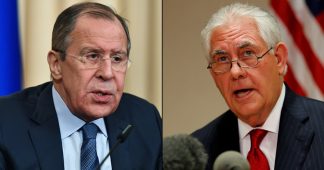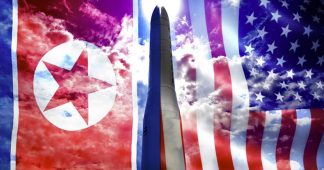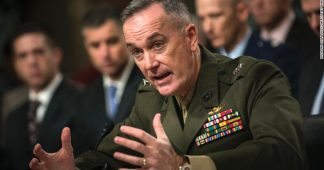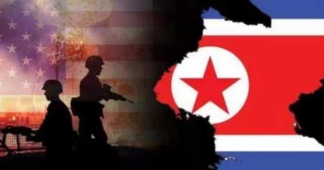By Patrick Martin
Gen. Joseph Dunford, chairman of the Joint Chiefs of Staff, gave a televised press briefing Monday afternoon on the US military presence in the West African country of Niger. His hour-long appearance came in the midst of a mounting clash between the White House and the widow of Sgt. La David Johnson, one of the four US soldiers killed in Niger on October 4.
Myeshia Johnson appeared early Monday on the ABC program “Good Morning America,” following nearly a week of public acrimony between the Trump administration and her family and friends, including Democratic Representative Frederica Wilson, over Trump’s arrogant and callous phone call October 17, in which he told the widow that her husband “knew what he signed up for” when he enlisted in the US Special Forces.
In her interview, Johnson refuted the lies told by Trump about his “condolence” call and confirmed the account given by Wilson in a series of media interviews last week, saying that Wilson’s remarks were “100 percent true.” She added that Trump appeared not to know her husband’s name, stumbling over it even though he said he had the military report on his death in front of him.
Johnson said the condolence call “made me cry because I was very angry at the tone of his voice.” The widow added that Pentagon officials had told her nothing about the circumstances of her husband’s death or why it took 48 hours to recover his body. The bodies of the other three US soldiers killed in action were recovered in the course of the firefight with Islamist militants.
Nor would the Pentagon allow her to view her husband’s remains, she said, even after the coffin was turned over to the family for burial. “There could be an empty box,” she said. Pentagon rules supposedly give the family final say in whether to see the remains.
She concluded the interview by declaring that she had nothing further to say to the president. Johnson is six months pregnant with the couple’s third child, who will never know her father. Her husband was buried Saturday in Hollywood, Florida, attended by relatives and members of Johnson’s military battalion.
Trump compounded the political damage by responding to Myeshia Johnson in a series of tweets that all but called her a liar, claiming that he had spoken the name of her husband during the call, “from the beginning, without hesitation,” while denying that anything he said was of a demeaning or dismissive character.
Dunford’s press conference had the character of a damage-control operation, with the highest-ranking US military officer, a highly political general who was appointed to a two-year term by Barack Obama and reappointed last month by Trump for a second term, intervening to pull the White House’s chestnuts out of the fire.
Dunford was also responding to comments by an array of senators and congressmen who have claimed they knew little of the US deployment in Niger and were surprised to discover, in the wake of the October 4 debacle, that there were 800 US soldiers protecting a US drone base and engaged in training and reconnaissance missions with the Nigerien military. The deployment in Niger—clearly a war zone—is the third largest US active combat mission, after Afghanistan and Iraq, but larger than Syria, at least in the number of troops deployed on the ground.
 A map with Niger indicated by red border
A map with Niger indicated by red borderDunford gave few details of the October 4 raid that ended with five Nigerien and four American soldiers killed and two more Americans wounded. He was unable to state how many Islamists had been killed, if any, thus confirming indirectly that the US forces and their allies had been forced to leave the battlefield in the hands of their opponents.
The general revealed that roughly equal numbers of fighters were engaged on both sides, with 30 Nigerien and 12 American soldiers confronted by 50 or so Islamists. Given the disparity in weaponry and the US ability to call in airstrikes, the protracted character of the combat and its bloody outcome suggest that the Islamists took the US-Nigerien force by surprise.
Dunford disputed accounts circulating online suggesting that there was an undue delay in the arrival of air support, in the form of French Mirage jets. The US-Nigerien force did not call for air support until an hour after the firefight began, he said. It took half an hour for the Mirage jets to be prepared for takeoff, and another half an hour to reach the battlefield, at which point they did not drop any bombs because they could not find the Islamist fighters.
Dunford added that the ground rules in Niger were that the US troops were to accompany Nigerien forces on missions only where no resistance was expected, let alone full-scale combat, thus confirming that the operation was carried out on the basis of faulty intelligence.
The main purpose of the press conference was not so much to convey new information, as to take a step back from the confrontational posture of Trump and White House Chief of Staff John Kelly, a retired four-star general, and from the suggestion by White House Press Secretary Sarah Sanders that any questioning of the Niger operation or Trump’s handling of the condolence calls was “inappropriate,” i.e., illegitimate.
General Dunford was at pains to declare that the American people had a right to get answers about the Niger operation. “I think we owe the families and American people transparency,” he said. He conceded that there was a “perception that the Department of Defense has not been forthcoming,” and repeatedly reassured the press representatives that they were asking “fair questions.”
At the same time, the top US general provided precious little information, only appealing for patience while the military continues its internal investigations. The Pentagon has not released many of the basic facts nearly three weeks after the battle. That did not stop the press from making a fawning show of prostration before the military chieftain. A number of reporters began their questioning by thanking the general for deigning to appear before them.
Congressional Democrats pressed ahead with criticism of Trump’s phone call and the overall conduct of the Niger operation, as always, seizing the opportunity to attack the Trump administration from the right and portray Trump as insensitive to the needs of the troops. Following the lead of Representative Wilson, they also sought to characterize Trump’s attitude to Sgt. Johnson and his widow, as well as Kelly’s criticism of the congresswoman herself, as racist.
This is a cover-up and a political diversion. Trump’s callous indifference towards the tragic fate of Sgt. Johnson is a class issue, not a race issue. It expresses the attitude of the financial aristocracy as a whole to the impact of the profit system on working people: whether it is young men and women sent into battle as cannon fodder, or workers maimed and killed on the job, or families whose livelihoods were destroyed by the financial looting that led to the 2008 Wall Street crash.
